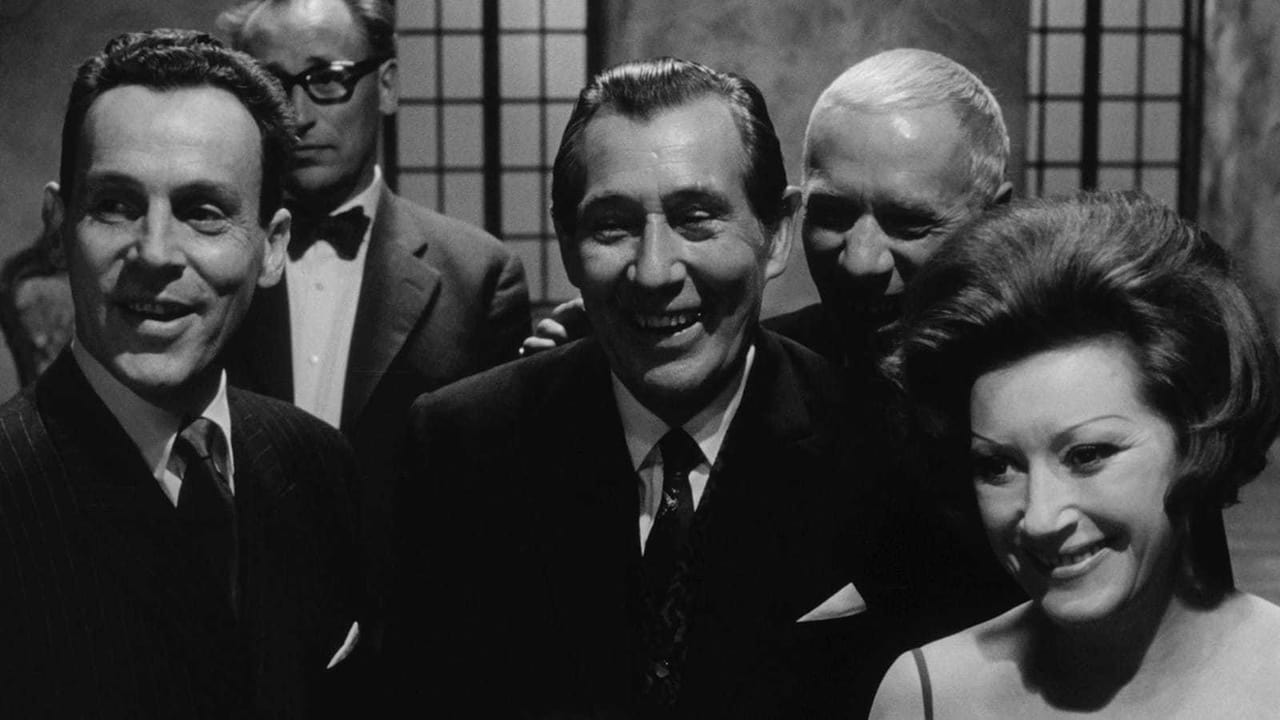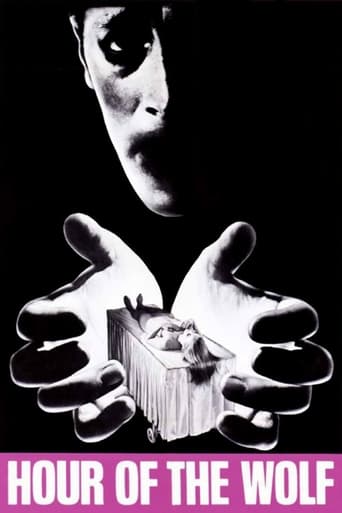

Max von Sydow is amazing as always. And Liv Ullman turns in a brilliant performance. But Ingmar Bergman is the real star of this film. His direction is top notch.The premise, a couple (wife pregnant) come to an island. He to paint. He has a past that haunts him. Troubled childhood, affair with a married woman, and an accidental, self-defense killing of a young boy.But the real issue at hand is his wife Alma's jealousy. As she becomes aware of his past affair, she begins to imagine him pulling farther and farther away. Bergman does a masterful job of making us believe that Johan is having illusions, but really the illusions are all Alma's.He tries to shoot her, I believe in self-defense. My belief for what became of Johan is that Alma killed him and ate him. She invented the "demons" and Johan's "insanity" as a way of playing this off.I believe this is one of the conclusion's Bergman was going for. The original script title was "The Cannibals". We are made to believe the "demons" ate Johan. But the demons never really existed, only Johan and Alma did. The only logical conclusion is that Alma's jealousy over Veronica drove her to the actions she took.Very well done film. And even if my theory is wrong, it is a reasonable conclusion for a viewer to come to. Consider that Alma even talks to us as if we are there, yet there is really no one there for her to talk to.I highly recommend this film.
... View More"The Hour of the Wolf" refers to that particular moment between night and day where sleep is at its deepest, where most dreams -consequently nightmares- gets the realest feeling, where most people die and are born, where we're at the most fragile and vulnerable state. In the end, it is such a fascinating accumulation of superlatives of creepy undertones, it would've been impossible for an explorer of the human condition like Ingmar Bergman not to tackle it.And to illustrate the eeriness of the titular notion, Bergman translates it into a mysterious pathology that took possession of a tortured artist's soul; a painter named Johan Borg and played by Max Von Sydow. The film is based on the fictional notes taken before his death (or disappearance?) and revealed in front of the camera by his widow (?) Alma, played by Liv Ullman. The two actors star again in a Bergmanian film in the same year than "Shame", Bergman's anti-war pamphlet but this is one more obscure and puzzling film, even by Bergman's standards.In fact, the film made me realize that despite the heavy psychological material carried by most Bergman movies, they were pretty much straight-forward about their subject and at the end, it was always a part of our human condition that revealed to us, mirrored by our relationship with time, with God, with the others. It's like each Bergman's movie played like a piece of puzzle that would constitute a magnificent and intelligent study of the human soul. But "The Hour of the Wolf" is one of these pieces of the puzzle you don't know where to put.This is not to separate the film from Bergman's other works, it's his first and –I guess- only take on supernatural and surrealistic material, and the result is aesthetically nightmarish and conveys well the horror inhabiting Johan's soul, but Bergman, as inaccessible as he is, always found a way to guide us to his characters, even at the price of a second viewing. I wanted to understand what was going into Johan's mind, was that sickness? Hallucinations? In a way, Alma mirrors these very feelings and like her, we want to know more about him.Some shadows of answers come when she sneaks into his diary, the reading episodes provide the first hints: one creepy dream involving a kid trying to kill him and an idyll with a girl named Vogler and played by Ingrid Thullin. Shot in high contrast and with a pretty furious editing, the kid's killing and drowning is one of the most disturbing sequences I've ever seen, my guess is that it supposed to evoke the repression of some childhood episodes, and maybe the child Johan kills is himself, the clue comes from his revelation of a childhood trauma later to Alma.The Vogler episode is echoed during a dinner where the couple meets a group of rich and eccentric slobs to the limits of perversity bourgeois (lead by Erland Josephson). They all seem to know about Johans' affair. They're obnoxious, uneducated, aggressive, one of the lady literally jumps at Johans, Josephson's wife implies that they try to take him from his wife, they're the closest players to the antagonists, and leave us a sentiment of total discomfort, like these creepy nightmares where we don't know where we are but can't wait to get the hell out.I guess "The Hour of the Wolf" encapsulates this feeling of continuous entrapment and impossibility to escape from a situation without getting through it, it's probably these repressed feelings that come back to the surface to better torture us. Maybe it's a surrealistic definition of guilt, guilt from one man's weakness. Which might explain that Johan decided to isolate himself from the world in the remote house leaving a peaceful and dull life with Alma, while he's lived quite a torturous and much more cinematically appealing life? And maybe the third act is the price he finally paid by not being totally sincere with his wife. It's made of a whole long sequence where they search Max in the forest, while he's in the castle and must play some twisted and pervert games, nudity, make-up, crows, all the most unsettling archetypes of nightmares are used and at the end, nothing but absence, absence of Max, of explanations "The Hour of the Wolf" leaves many interrogations, and so does the film. Right now, I'm still having this 'what the hell did I see?' expression I had when it ended.I certainly wouldn't be a fan of Bergman if I had seen this first, but because I'm a fan, I try to see the film with more magnanimous eyes. I can accept the absence of definite answers and the way Bergman drowns his work into his own creativity, my take is that Bergman invites us to embrace these moments where we're directly haunted by our own demons, where we must face the true facet of our personality, when the nightmare gets its realest feeling, perhaps the closest moment in life is when it looks like a nightmare."The Hour of the Wolf" is certainly the closest Bergman's film to a nightmare and I wonder if the deliberate noises he made at the beginning of the film were made to reassure us that we were only watching a film, as to insist that no matter how creepy this stuff is, it's still the product of one's imagination. I guess I prefer Bergman when he approaches our reality, but even the way we handle our reality is conditioned by our subconscious, and all the feelings we try to repress. Maybe this is "The Hour of the Wolf", this moment where for some reason; we have good reasons to act irrational.But I certainly wouldn't recommend it as a first Bergman's film.
... View MoreThis film plays on all the tensioned strings of love as the most powerful emotion--the most direct segue to insanity. Love is something we want to happen selfishly, but by its very nature requires a mutual, balanced, and undivided emotion. The madness that ensues in these characters is clearly tied to the various imbalances that occur: unrequited love, partial love, projections of the desired state of of the loved one upon the loved one, incompatibility torturing those who lust for love, sexual lust, and most of all...the permanent scar left upon those who loved truly, and lost. The sheer all-encompassing nature of this film, the fact that it touches on the madness behind so many forms of love is a testament to its concise power. Interestingly--unlike most films and art films which attempt only to share a story of the human experience or to evoke with us an emotion--Hour of the Wolf is also very much a practical film, because above all, it is a warning.
... View MoreThe quote in the film that I mention does lead onto other 'happenings', as Max von Sydow recounts the Hour in question - as he fumbles to light candles in the dark.With such, it does sound like this film's going to be about werewolves and vampires and such, but this is all human, the area of darkness that Bergman often visited and probably no more so here than with any other film. It's like he's made a feature of all the ghostly and demonic thoughts and dreams he's ever had and stuffed them all into one movie.Which is actually no bad thing but I would suggest that so many ripe and vivid nightmares make for a great chilling horror chiller and less his usual area of excellence, the study of human psyche and persona. At one point, our troubled artist with lots of history to block out describes being locked in a wardrobe as a child where a little monster that ate children's toes lived and from which he couldn't escape. Since watching Hour Of the first time round I read in an autobiography that Bergman's profound sense of doom and depression stemmed from being accidentally locked in a mortuary as a boy. My skin crawled in recognition of this scenario when von Sydow describes the story about the wardrobe....is there a lot more in Hour Of that's biographical?Whichever way you want to take it, the beginning has more relationship and personal drama going on whilst from 45 mins on, when 'The Hour of the Wolf' is flashed up, it's hallucinatory hell, much really quite absurd but also really rather effective at being chilling and scary.Liv Ullman, as the artist's wife, who discovers these dark secrets in his diaries is intense and excellent, as always, but I would still stand by saying that Hour Of isn't as deeply profound as some say - and possibly, if one tried to dissect it all too much, you'd be starting to experience some of those nightmares too!My slimline DVD is part of the 4 disc The Ingmar Bergman Collection.
... View More